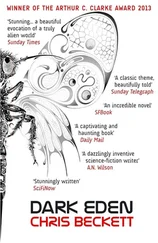“And that surprises you.”
“It astonishes me.”
“It shouldn’t,” she said.
“No?”
She shook her head. “Not at all. My father used to beat the living hell out of my mother.”
My stomach lurched a little bit at the revelation, but years of pastoral hand-holding kept me from reacting in any visible way, and I mouthed the words I’d probably said hundreds of times every year of my ministerial life: “I’m sorry. I’m very, very sorry.”
“Don’t be. You weren’t the one who hit her.”
“Still… I’m sorry.”
“No, no, no. I’m sorry. I shouldn’t have dropped the bombshell on you like that. I’m used to most people knowing.”
“Knowing?”
“A lot of their story is in Angels and Aurascapes .”
“Are they divorced?”
She gazed out at the maples behind my house and then looked me squarely in the eye. “They’re dead. When I was fourteen, a few months after my sister and I were sent away to boarding school, my father killed my mother-and then killed himself.”
FROM ANGELS AND AURASCAPES BY HEATHER LAURENT (PP. 51-52)

… and then killed himself .
The head of the school, who had been deferring to the school psychiatrist for most of the past half hour, finally spoke. He asked my sister and me what we wanted to do, but neither of us answered him. We couldn’t, because neither of us was capable of giving him the answers he needed. What did I want to do? My God, I was fourteen years old. I wanted to bring my mother back. I wanted to go back in time. I wanted to know where I was going to live-who was going to take care of me. I wanted to learn how to drive. Those were the things that crossed my mind in response to his question, those were the first desires that came to me. And what did my sister want? She was sixteen, she probably wanted pretty much the same things and to have the same sorts of answers. And the headmaster could grant us absolutely none of our desires or answer our most basic questions .
I understood, of course, that traveling back in time and getting my mother back were implausible wishes and never going to happen. But as we sat in the headmaster’s office, I imagined quite concretely what I would do if I could drive-what, to go back to that initial question of his, I wanted .
And I understood I wanted this: I wanted to drive to my grandmother’s house in upstate New York and explain to her that I was all finished with this fine school in New England. And then I wanted to go to one of the huge shopping malls near the old air force base in Plattsburgh, the ones kept in business by the Canadians, and buy all the clothes that my father had forbidden me from wearing and that my mother said I didn’t dare bring into the house. I wanted, in essence, to wear a shirt with spaghetti straps that revealed my shoulders and tight-fitting shorts made from blue jeans that had been faded almost to a robin’s egg blue. I wanted to get my ears pierced at the kiosk in the corridor by the poster-and-frame shop in the mall, and then I wanted to buy earrings. Lipstick. Mascara .
I wanted to drive my friends to my house, and I wanted them all to sit with me on the front porch without fearing that my father would embarrass me with his temper or my mother with her drinking .
That, I realized, was what I wanted to do .
And, fortunately, those images of not-unconventional teenage taste crowded out the reality of what had actually happened to my mother at the hands of my father .
Still, I hadn’t spoken aloud any of this, I hadn’t answered the head of the school’s question. Finally, after the sort of conversational lull that’s polite only after someone has died, he turned to my sister and asked Amanda what she wanted to do .
“I want to go home,” I heard Amanda tell him, her voice appropriately subdued. She was an aspiring painter at the time and even then savored her solitude .
The head of the school nodded and smiled gently. This was the right response, even if home-technically still that cold and massive Victorian, which, despite the resources of both my parents’ families, was in desperate need of a good scraping and painting-was about to become a pretty vague place .
“And you, Heather?” he asked again. “What would you like?”
“A shirt with spaghetti straps,” I answered. “And pierced ears.”
That afternoon Heather shared with me an abbreviated but nonetheless harrowing account of her parents’ sordid and, in the end, horrific marriage. In some ways its trajectory was eerily similar to the Haywards’. But, of course, in other ways it had its own idiosyncrasies and detours. Tolstoy was right about families. The most salient feature of her parents’ marriage was money: Both Alex and Courtney Laurent came from what my mother would refer to as “families with means,” though I am not sure that expression does justice to the veritable bank vaults that subsidized the Laurents. Apparently Alex and Courtney had grown accustomed to getting everything, needing nothing, and behaving in a fashion that suggested a complete uninterest in the responsibilities that came with all those advantages. The result, in Heather’s opinion, is that her father was selfish and spoiled, while her mother was entitled and helpless. It was, in her mother’s case, almost a learned helplessness. And so while Courtney Laurent had the fiscal resources at her disposal that most abused women lack, she would have needed someone to remind her of the reality that she had alternatives. Options. But Alex, in the tradition of most batterers, had seen to it by then that she was more or less entombed in the marriage: cut off from her family, out of touch with her closest friends. The Laurents had more money and more connections than the Haywards (though the Haywards were, by any fiscal barometer, extremely comfortable) and thus made a much bigger media splash when Alex Laurent shot his wife in the living room and then killed himself, but otherwise the scaffolding of the tragedy was not dissimilar.
Later Heather and I ventured to Ginny O’Brien’s to retrieve the key to the Hayward house. Unlike me, Ginny knew exactly who Heather Laurent was, and in the woman’s presence her demeanor was transformed from shaken and grieving to a little giddy. She was suddenly a bit like a hyperactive puppy, and I was reminded of the Haywards’ affectionate but needy springer spaniel. Ginny had read Angels and Aurascapes , and when I introduced them, she told the author how much the book had meant to her-and how she had already marked A Sacred While as “to read” on all her online book forums and discussion groups, and suggested to the church book group that they tackle the new one together that autumn. (My sense, now having read both of Heather’s books, is that Ginny most likely was made deeply uncomfortable by Heather’s chapters on the “auras of death” but saw the logic and importance of, once in a while, taking a long walk in the woods with an angel.) We did not see either Katie or her grandparents, but I hadn’t expected we would. I had spent a part of the morning with the three of them in my office at the church, and I knew they had a variety of errands that afternoon that ranged from the merely unpleasant to the downright ghoulish. They were seeing the mortician in Bennington, for instance, to pick out a casket, and deciding whether Alice should be buried in the cemetery in Haverill or with other members of her family in Nashua. I knew that her parents were going to choose Nashua soon enough and were simply trying to spare the feelings of Alice’s friends and her pastor in Vermont. But they were nonetheless taking the time to visit the cemetery, an act of due diligence that couldn’t have been easy.
Читать дальше












